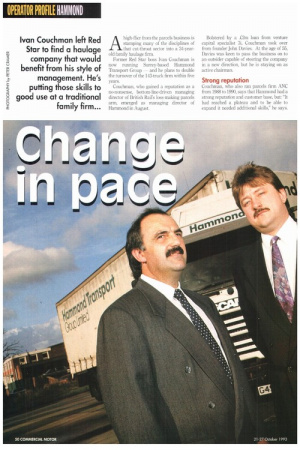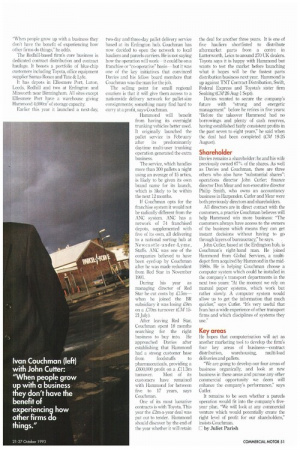A high-flier from the parcels business is stamping many of the
Page 54

Page 55

If you've noticed an error in this article please click here to report it so we can fix it.
disciplines of that cut-throat sector into a 34-yearold family haulage firm.
Former Red Star boss lvan Couchman is now running Surrey-based Hammond Transport Group -and he plans to double the turnover of the 143-truck firm within five years.
Couchman, who gained a reputation as a no-nonsense, bottom-line-driven managing director of British Rail's loss-making parcels arm, emerged as managing director of Hammond in August. Bolstered by a r2m loan from venture capital specialist 3i, Couchman took over from founder John Davies. At the age of 55, Davies was keen to pass the business on to an outsider capable of steering the company in a new direction, but he is staying on as active chairman.
Couchman, who also ran parcels firm ANC from 1988 to 1990, says that Hammond had a strong reputation and customer base, but: "It had reached a plateau and to be able to expand it needed additional skills," he says. "When people grow up with a business they don't have the benefit of experiencing how other firms do things," he adds.
The Redhill-based firm's core business is dedicated contract distribution and contract haulage. It boasts a portfolio of blue-chip customers including Toyota, office equipment supplier Sa mas Roneo and Tate & Lyle.
It has depots in Ellesmere Port, Luton, Leeds, Redhill and two at Erdington and Minworth near Birmingham. All sites except Ellesmere Port have a warehouse giving Hammond 4,600mof storage capacity
Earlier this year it launched a next-day, two-day and three-day pallet delivery service based at its Erdington hub. Couchman has now decided to open the network to local hauliers and parcels carriers. He is not saying how the operation will work it could be on a franchise or "co-operative" basis-but it was one of the key initiatives that convinced Davies and his fellow board members that Couchman was the man for the job.
The selling point for small regional couriers is that it will give them access to a nationwide delivery network for pallet-size consignments; something many find hard to carry at a profit, says Couchman.
Hammond will benefit from having its overnight trunk Mg vehicles better used. It originally launched the pallet service in February after its predominantly daytime multi-user trunking operation generated the extra business.
The service, which handles more than 300 pallets a night using an average of 15 artics, is likely to be given its own brand name for its launch, which is likely to be within the next 12 months.
If Coucliman opts for the franchise system it would not be radically different from the ANC system. ANC has a network of 71 franchised depots, supplemented with five of its own, all delivering to a national sorting hub at Newcastle-under-Lyme. Staffs. ANC was one of the companies believed to have been eyed-up by Couchman after he was made redundant from Red Star in November 1991.
During his year as managing director of Red Star he cut costs by £15m— when he joined the BR subsidiary it was losing £9m on a 1,70m turnover (Cili 1521 July).
After leaving Red Star, Couchman spent 18 months searching for the right business to buy into. He approached Davies after establishing that Hammond had a strong customer base from foodstuffs to pharmaceuticals, providing a £600,000 profit on a £11.3m turnover. Most of its customers I lave remained with Hammond for between five to 17 years, says Couchman.
One of its most lucrative contracts is with Toyota. This year the £2m -a-yeardeal was put out to tender. Hammond should discover by the end of the year whether it will retain
the deal for another three years. It is one of five hauliers shortlisted to distribute aftermarket parts from a centre in Lutterworth, Leics to around 270 UK dealers. Toyota says it is happy with Hammond but wants to test the market before launching what it hopes will be the fastest parts distribution business next year. Hammond is up against TNT Contract Distribution, Swift, Federal Express and Toyota's sister firm Seaking (CM 26 Aug-1 Sept).
Davies wanted to secure the company's future with "strong and energetic management" before he retires in five years: "Before the takeover Hammond had no borrowings and plenty of cash reserves, having established fairly consistent profits in the past seven to eight years," he said when the deal had been completed (CM 19-25 August).
Davies remains a shareholder: he and his wife previously owned 67% of the shares. As well as Davies and Couchman, there are three others who also have "substantial shares": operations director John Cutler; finance director Don War and non-executive director Philip Smith, who owns an accountancy business in Harpenden. Cutler and War were both previously directors and shareholders.
All directors are in direct contact with the customers, a practice Couchman believes will help Hammond win more business: "The customers always have access to the owners of the business which means they can get instant decisions without having to go through layers of bureaucracy" he says.
John Cutler, based at the Erdington hub, is Couchman's right-hand man. He joined Hammond from Global Services, a multidepot firm acquired by Hammond in the mid1980s. He is helping Couchman choose a computer system which could be installed in the company's transport departments in the next two years: "At the moment we rely on manual paper systems, which work but rather slowly A computer system would allow us to get the information that much quicker," says Cutler. "It's very useful that Ivan has a wide experience of other transport firms and which disciplines of systems they use."
He hopes that computerisation will act as another marketing tool to develop the firm's four key areas of business—contract distribution, warehousing, multi-load deliveries and pallets.
"We are going to develop our four areas of business organically and look at new business in these areas and pursue any other commercial opportunity we deem will enhance the company's performance," says Cutler.
It remains to be seen whether a parcels operation would fit into the company's fiveyear plan. "We will look at any commercial venture which would potentially create the right level of profit for our shareholders," insists Couchman.
E by Juliet Parish
































































































